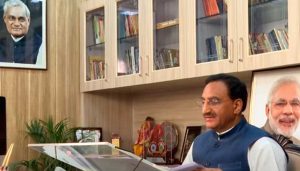 “YUKTI 2.0” platform has been virtually launched by the Union Minister of Human Resource Development, Ramesh Pokhriyal ‘Nishank’. The platform will help in systematically adopting the technologies having commercial potential and information related to incubated startups in our higher education institutions. The Young India combating COVID with Knowledge, Technology and Innovation (YUKTI) platform seeks to cover the different dimensions of COVID-19 challenges in a very holistic and comprehensive way. The platform has been developed by the Ministry of HRD. YUKTI 2.0 is logical extension of earlier version of ‘YUKTI’ and has been launched to find out ideas relevant in COVID pandemic. With the help of this platform, MHRD aims to identify innovative solutions from India’s higher and technical institutions. During the launch, HRD minister encouraged students, faculty members, startups including other stakeholders of higher education institutions to get them registered on the YUKTI portal and share their technologies and innovations. “YUKTI 2.0” platform has been virtually launched by the Union Minister of Human Resource Development, Ramesh Pokhriyal ‘Nishank’. The platform will help in systematically adopting the technologies having commercial potential and information related to incubated startups in our higher education institutions. The Young India combating COVID with Knowledge, Technology and Innovation (YUKTI) platform seeks to cover the different dimensions of COVID-19 challenges in a very holistic and comprehensive way. The platform has been developed by the Ministry of HRD. YUKTI 2.0 is logical extension of earlier version of ‘YUKTI’ and has been launched to find out ideas relevant in COVID pandemic. With the help of this platform, MHRD aims to identify innovative solutions from India’s higher and technical institutions. During the launch, HRD minister encouraged students, faculty members, startups including other stakeholders of higher education institutions to get them registered on the YUKTI portal and share their technologies and innovations. |
 The Food Processing Edition of the “Exclusive Investment Forum” has been launched by the Union Food Processing Industries Minister Harsimrat Kaur Badal. It has been designed by the Invest India, the National Investment Promotion & Facilitation Agency of the Government of India. Investment Facilitation Cell of Ministry of Food Processing Industries (MoFPI) was also established during the forum to handhold both domestic and foreign investors for doing business in India. The “Exclusive Investment Forum” is a sectoral series to conduct comprehensive conversations among global industry leaders and key decision makers from the highest levels of the Central and State Governments. The senior most policy makers from Union Government and 6 State Governments namely Andhra Pradesh, Assam, Madhya Pradesh, Punjab, Telangana and Uttar Pradesh participated in the forum. The Food Processing Edition of the “Exclusive Investment Forum” has been launched by the Union Food Processing Industries Minister Harsimrat Kaur Badal. It has been designed by the Invest India, the National Investment Promotion & Facilitation Agency of the Government of India. Investment Facilitation Cell of Ministry of Food Processing Industries (MoFPI) was also established during the forum to handhold both domestic and foreign investors for doing business in India. The “Exclusive Investment Forum” is a sectoral series to conduct comprehensive conversations among global industry leaders and key decision makers from the highest levels of the Central and State Governments. The senior most policy makers from Union Government and 6 State Governments namely Andhra Pradesh, Assam, Madhya Pradesh, Punjab, Telangana and Uttar Pradesh participated in the forum. |
 This scheme was announced as a part of the AtmaNirbhar Bharat Package by Finance Minister back on 13th May 2020. On 24th June 2020, the Credit Guarantee Scheme for Sub-ordinate Debt (CGSSD) was launched. The scheme is also called as Distressed Assets Fund- Sub- Ordinate Debt for MSMEs. Union Minister of Medium, Small and Marginal Enterprises (MSMEs) Nitin Gadkari launched the scheme. After consultation with the Reserve Bank of India, SIDBI, and the Ministry of Finance, the scheme was approved by the Committee on Economic Affairs. This scheme was announced as a part of the AtmaNirbhar Bharat Package by Finance Minister back on 13th May 2020. On 24th June 2020, the Credit Guarantee Scheme for Sub-ordinate Debt (CGSSD) was launched. The scheme is also called as Distressed Assets Fund- Sub- Ordinate Debt for MSMEs. Union Minister of Medium, Small and Marginal Enterprises (MSMEs) Nitin Gadkari launched the scheme. After consultation with the Reserve Bank of India, SIDBI, and the Ministry of Finance, the scheme was approved by the Committee on Economic Affairs. |
|
|
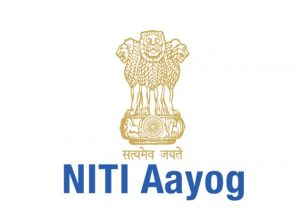 NITI Aayog will launch the “Decarbonising Transport in India” project in collaboration with International Transport Forum (ITF). The project would be launched to develop a pathway towards a low-carbon transport system for India. It will design a tailor-made transport emissions assessment framework for India and facilitate the government with a comprehensive understanding of present as well as future transport activities along with the related CO2 emissions. The project “Decarbonising Transport in India” is a part of the International Transport Forum’s “Decarbonising Transport in Emerging Economies (DTEE)” family of projects. DTEE supports transport decarbonisation across different world regions such as Argentina, Azerbaijan, Morocco and India. NITI Aayog will launch the “Decarbonising Transport in India” project in collaboration with International Transport Forum (ITF). The project would be launched to develop a pathway towards a low-carbon transport system for India. It will design a tailor-made transport emissions assessment framework for India and facilitate the government with a comprehensive understanding of present as well as future transport activities along with the related CO2 emissions. The project “Decarbonising Transport in India” is a part of the International Transport Forum’s “Decarbonising Transport in Emerging Economies (DTEE)” family of projects. DTEE supports transport decarbonisation across different world regions such as Argentina, Azerbaijan, Morocco and India. |
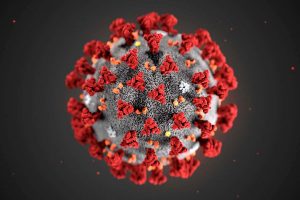 France has signed a loan agreement of 200-million-euros with India to boost India’s COVID-19 response. With the loan agreement, France aims to increase the state and central governments’ capacities to support India’s most vulnerable people in the wake of the COVID-19 crisis. World Bank has developed the programme design in collaboration with the Indian authorities to optimize and expand the existing social protection measures taken by India. World Bank would be the lead funder of this programme, being supported by French Development Agency (AFD) including other multilateral and bilateral development banks. The programme will focus on Pradhan Mantri Garib Kalyan Yojna by providing benefits to the low-income families so that the health, social as well as the economic shocks arising from Covid-19 do not negatively affect people’s well-being and their contribution to the India’s economic growth in the long run. France has signed a loan agreement of 200-million-euros with India to boost India’s COVID-19 response. With the loan agreement, France aims to increase the state and central governments’ capacities to support India’s most vulnerable people in the wake of the COVID-19 crisis. World Bank has developed the programme design in collaboration with the Indian authorities to optimize and expand the existing social protection measures taken by India. World Bank would be the lead funder of this programme, being supported by French Development Agency (AFD) including other multilateral and bilateral development banks. The programme will focus on Pradhan Mantri Garib Kalyan Yojna by providing benefits to the low-income families so that the health, social as well as the economic shocks arising from Covid-19 do not negatively affect people’s well-being and their contribution to the India’s economic growth in the long run. |
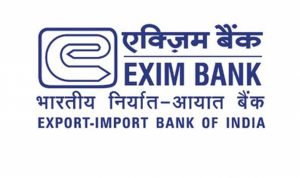 A Line of Credit (LOC) of USD 20.10 million has been extended by the Export-Import Bank of India (Exim Bank) on behalf of the Government of India, to the Government of the Republic of Nicaragua. This LOC has been extended for reconstruction of Aldo Chavarria Hospital in the Republic of Nicaragua. With the signing of the above LOC Agreement for reconstruction of hospital, the total number of LOCs extended by Exim Bank to the Republic of Nicaragua comes to four, comprising projects which includes supply of equipment for building two substations, construction of transmission lines, building new substation, expansion of the existing substations and reconstruction of a hospital. The total value of the 4 LOCs is USD 87.63 million. A Line of Credit (LOC) of USD 20.10 million has been extended by the Export-Import Bank of India (Exim Bank) on behalf of the Government of India, to the Government of the Republic of Nicaragua. This LOC has been extended for reconstruction of Aldo Chavarria Hospital in the Republic of Nicaragua. With the signing of the above LOC Agreement for reconstruction of hospital, the total number of LOCs extended by Exim Bank to the Republic of Nicaragua comes to four, comprising projects which includes supply of equipment for building two substations, construction of transmission lines, building new substation, expansion of the existing substations and reconstruction of a hospital. The total value of the 4 LOCs is USD 87.63 million. |
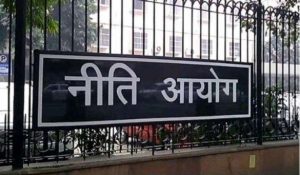 Niti Aayog has formed a panel to develop a job platform for migrant labourers. Through this panel, Niti Aayog includes top officials of tech companies like Google, Microsoft and Tech Mahindra. This platform helps migrant workers have lost their jobs during the lockdown period. The main aim is to develop a platform that can help blue-collar workers find job opportunities in their own language and location. The platform will connect job seekers, employers, government agencies, skill centres and external partners using new-age technologies like artificial intelligence and machine learning. The project would come up with a multilingual application that can be accessed via feature phones and help identify location-based jobs, skill development gaps. The panel has some prominent names from the industry including Reliance Industries President Kiran Thomas, Microsoft India President Anant Maheshwari, Tech Mahindra MD and CEO CP Gurnani, Google India country manager and vice president Sanjay Gupta, Bharti Airtel CEO Gopal Vittal, among others. As per estimates, there are over 40 crore workers in the unorganized sector accounting for around 30 per cent of India”s GDP and nearly 60 per cent of these migrant workers are either semi-skilled or unskilled who struggle every day to find the right job opportunity. Niti Aayog has formed a panel to develop a job platform for migrant labourers. Through this panel, Niti Aayog includes top officials of tech companies like Google, Microsoft and Tech Mahindra. This platform helps migrant workers have lost their jobs during the lockdown period. The main aim is to develop a platform that can help blue-collar workers find job opportunities in their own language and location. The platform will connect job seekers, employers, government agencies, skill centres and external partners using new-age technologies like artificial intelligence and machine learning. The project would come up with a multilingual application that can be accessed via feature phones and help identify location-based jobs, skill development gaps. The panel has some prominent names from the industry including Reliance Industries President Kiran Thomas, Microsoft India President Anant Maheshwari, Tech Mahindra MD and CEO CP Gurnani, Google India country manager and vice president Sanjay Gupta, Bharti Airtel CEO Gopal Vittal, among others. As per estimates, there are over 40 crore workers in the unorganized sector accounting for around 30 per cent of India”s GDP and nearly 60 per cent of these migrant workers are either semi-skilled or unskilled who struggle every day to find the right job opportunity. |
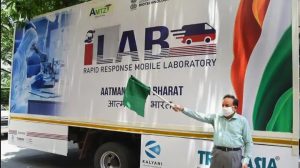 Union Health Minister, Harsh Vardhan has launched India’s first mobile lab for COVID-19 testing. The Infectious Disease Diag Lab (I-Lab) – Rapid Response Mobile Laboratory has been developed with the support from the Department of Biotechnology, Ministry of Science and Technology and Andhra Pradesh Med-tech Zone (AMTZ) under DBT-AMTZ COMManD (COVID Medtech Manufacturing Development) Consortia. Union Health Minister, Harsh Vardhan has launched India’s first mobile lab for COVID-19 testing. The Infectious Disease Diag Lab (I-Lab) – Rapid Response Mobile Laboratory has been developed with the support from the Department of Biotechnology, Ministry of Science and Technology and Andhra Pradesh Med-tech Zone (AMTZ) under DBT-AMTZ COMManD (COVID Medtech Manufacturing Development) Consortia. |
|
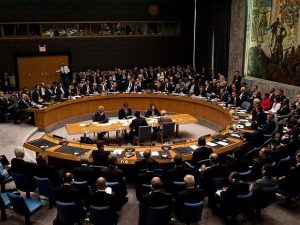 India has been elected as the non-permanent member of the United Nations Security Council. India has won the election for a two-year term after winning 184 votes in the 193-member General Assembly. India won the non-permanent seat from the Asia-Pacific category for the 2021-22 term which will begin on 1st January 2021. Earlier India has been elected as a non-permanent member of the Council for the following years: 1950-1951, 1967-1968, 1972-1973, 1977-1978, 1984-1985, 1991-1992 and 2011-2012. Ireland, Mexico and Norway also won the Security Council elections along with India. The United Nations high-table comprises of five permanent members and 10 non-permanent members. India has been elected as the non-permanent member of the United Nations Security Council. India has won the election for a two-year term after winning 184 votes in the 193-member General Assembly. India won the non-permanent seat from the Asia-Pacific category for the 2021-22 term which will begin on 1st January 2021. Earlier India has been elected as a non-permanent member of the Council for the following years: 1950-1951, 1967-1968, 1972-1973, 1977-1978, 1984-1985, 1991-1992 and 2011-2012. Ireland, Mexico and Norway also won the Security Council elections along with India. The United Nations high-table comprises of five permanent members and 10 non-permanent members. |
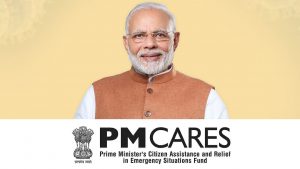 The Trustees of the Prime Minister’s Citizens Assistance and Relief in Emergency Situations (PM CARES) fund has appointed, New Delhi based Chartered Accountants, SARC & Associates, as its auditors for the next three years. The SARC & Associates headed by Sunil Kumar Gupta is also the auditor of the PM’s National Relief Fund(PMNRF) appointed in 2019. The Prime Minister, as chairperson of the Board of Trustees of the fund, has the power to nominate three trustees to the board. They shall be eminent persons in the field of research, health, science, social work, law, public administration or philanthropy. The fund is administered on an honorary basis by the joint secretary of administration in the Prime Minister’s Office(PMO) and assisted by an officer in a director or deputy secretary rank in the PMO. The Trustees of the Prime Minister’s Citizens Assistance and Relief in Emergency Situations (PM CARES) fund has appointed, New Delhi based Chartered Accountants, SARC & Associates, as its auditors for the next three years. The SARC & Associates headed by Sunil Kumar Gupta is also the auditor of the PM’s National Relief Fund(PMNRF) appointed in 2019. The Prime Minister, as chairperson of the Board of Trustees of the fund, has the power to nominate three trustees to the board. They shall be eminent persons in the field of research, health, science, social work, law, public administration or philanthropy. The fund is administered on an honorary basis by the joint secretary of administration in the Prime Minister’s Office(PMO) and assisted by an officer in a director or deputy secretary rank in the PMO. |
You need to login to perform this action.
You will be redirected in
3 sec
